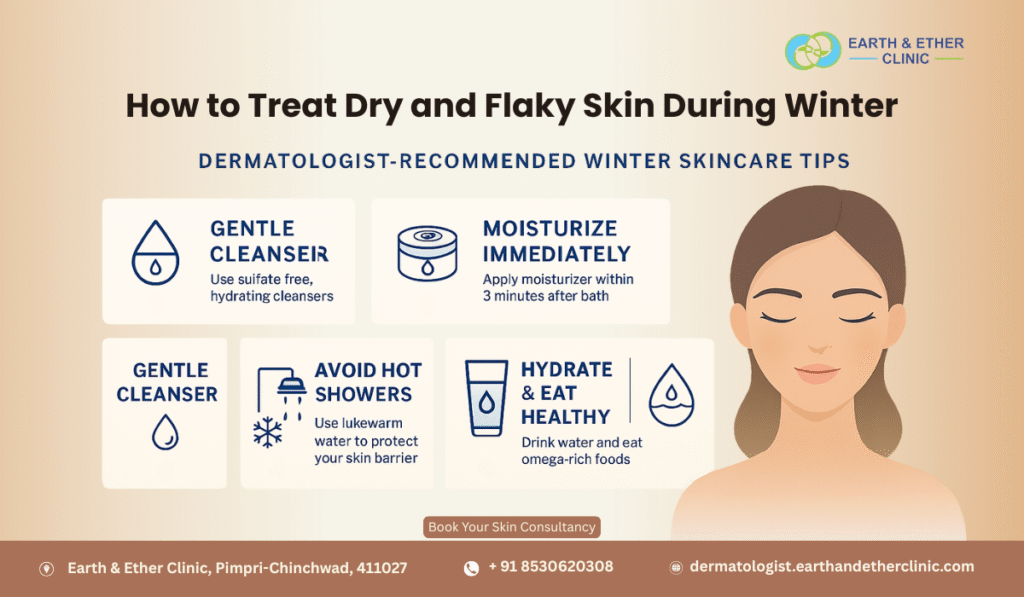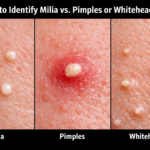When the temperature drops, your skin often becomes the first victim of harsh winter air. The combination of low humidity, cold winds, and indoor heating strips away natural moisture, leaving skin dry, tight, and flaky. According to a leading Dermatologist in Pune, winter dryness is one of the most common seasonal concerns, and if left untreated, it can damage your skin barrier and lead to irritation or premature aging.
In this blog, we’ll explore why dry skin occurs during winter, how to treat it effectively, and what preventive care can keep your skin supple and hydrated throughout the season.
Understanding Why Skin Becomes Dry in Winter
Winter dryness occurs when the skin loses more water than it retains. This happens due to multiple factors:
- Low Humidity Levels:
Cold air holds less moisture, leading to reduced hydration in the skin’s outer layer. - Hot Showers and Indoor Heating:
Though comforting, long hot baths and indoor heaters can strip the skin’s natural oils, worsening dryness. - Harsh Soaps and Cleansers:
Many soaps contain sulfates and alcohols that further disrupt the skin barrier. - Reduced Oil Production:
During winter, sebum (natural oil) production slows down, making it harder for the skin to retain moisture. - Environmental Exposure:
Constant exposure to cold wind and pollution aggravates dryness and flakiness.
Signs of Winter-Induced Dry Skin
Recognizing the early symptoms of dryness helps prevent long-term skin damage. Common signs include:
- Rough or tight skin after washing
- Visible flaking or peeling
- Dull and uneven skin tone
- Itchiness or mild irritation
- Cracks or redness, especially around the nose and lips
If these symptoms persist despite home care, consulting a Dermatologist in Pune can help identify underlying causes and provide a personalized skincare plan.
Best Skincare Routine for Dry and Flaky Skin
A consistent and gentle skincare routine is essential to restore and maintain moisture during the cold months. Follow this dermatologist-approved regimen:
1. Gentle Cleansing
Use a mild, hydrating cleanser free from alcohol, fragrance, and sulfates. Cleansers containing ceramides, glycerin, or hyaluronic acid help maintain the skin barrier while removing impurities.
Avoid over-cleansing, as it can strip away natural oils and make the skin more vulnerable to flakiness.
2. Moisturize Immediately After Bathing
Timing matters. Apply moisturizer within 2–3 minutes after washing your face or showering to lock in water content.
Choose creams or ointments instead of lotions, as they provide better occlusion and hydration. Look for ingredients such as:
- Shea butter
- Hyaluronic acid
- Squalane
- Ceramides
- Petrolatum
3. Use a Humidifier Indoors
Central heating systems and indoor air conditioning reduce humidity levels drastically. Using a humidifier at home helps maintain moisture in the air, preventing excessive dryness.
4. Avoid Long Hot Showers
While hot water feels relaxing, it can dehydrate your skin. Opt for lukewarm water instead and limit showers to 10–15 minutes. This small change can significantly reduce dryness.
5. Exfoliate Carefully
Dead skin cells accumulate more during winter, leading to dullness and flakiness. Gentle exfoliation once or twice a week helps remove dead skin and allows moisturizers to penetrate better.
Use lactic acid or mild AHAs for chemical exfoliation, but avoid harsh scrubs that can irritate already dry skin.
6. Protect Your Skin Barrier
Your skin barrier is your first defense against dryness and irritation. Strengthen it by using products enriched with niacinamide, ceramides, or panthenol.
Additionally, avoid alcohol-based toners or astringents, as they can compromise barrier function.
7. Hydrate From Within
Skin hydration doesn’t depend solely on topical products. Drinking enough water, consuming omega-3 fatty acids (from nuts, seeds, or fish), and eating antioxidant-rich foods can significantly improve skin texture.
8. Nighttime Skincare Routine
Night is when the skin repairs itself. Applying a rich night cream or sleeping mask ensures continuous hydration. If your skin is extremely dry, layering a few drops of facial oil over your moisturizer can help seal in moisture.
Common Mistakes That Worsen Dry Skin
Even the best skincare routine can fail if these common mistakes are made:
- Using foaming or alcohol-based cleansers
- Over-exfoliating in an attempt to remove flakes
- Ignoring sunscreen during winter
- Using fragrances or essential oils directly on skin
- Skipping moisturizer when skin feels oily
Avoiding these habits will help maintain your skin’s natural balance.
Dermatologist-Recommended Treatments for Severe Dryness
If home remedies and OTC products don’t provide relief, medical treatments may be necessary. A skin specialist in Hinjewadi can recommend the following based on your skin condition:
- Prescription Moisturizers: Containing higher concentrations of ceramides and urea to deeply hydrate.
- Barrier Repair Creams: To heal cracks and reduce inflammation.
- Hydrating Facials or Medi-Treatments: Dermatologist-administered procedures like hydrafacial or oxygen therapy restore moisture and vitality.
- Topical Steroids (for eczema-prone skin): To control severe irritation or redness.
Professional consultation ensures your skin receives the right care for lasting results.
Seasonal Skincare Tips for Preventing Flaky Skin
- Avoid using strong chemical peels or retinoids too frequently in winter.
- Always apply broad-spectrum sunscreen, even on cloudy days.
- Wear cotton or silk layers under wool clothing to prevent irritation.
- Carry a small moisturizer and lip balm when outdoors.
- Avoid alcohol and caffeine in excess, as they dehydrate the skin.
Small preventive measures can make a big difference in how your skin feels and looks.
When to See a Dermatologist
If dryness leads to persistent redness, cracks, or itching, it might indicate eczema, psoriasis, or contact dermatitis. These conditions require professional assessment and tailored treatments.
A skin doctor in Akurdi can diagnose your exact skin type and recommend targeted solutions — from prescription creams to clinical treatments — ensuring your skin remains healthy even in harsh winter months.
Conclusion
Winter dryness may seem inevitable, but with the right skincare routine, lifestyle adjustments, and professional advice, you can maintain soft, smooth, and hydrated skin all season long. Remember, the key lies in hydration, barrier protection, and consistency.
If your skin continues to feel rough, irritated, or flaky despite following a proper routine, consider consulting a qualified Dermatologist in Pune. Expert evaluation helps identify underlying issues and provides long-term solutions tailored to your skin’s needs.
Visit: dermatologist.earthandetherclinic.com
for professional dermatology care, advanced skin treatments, and personalized skincare guidance this winter.





